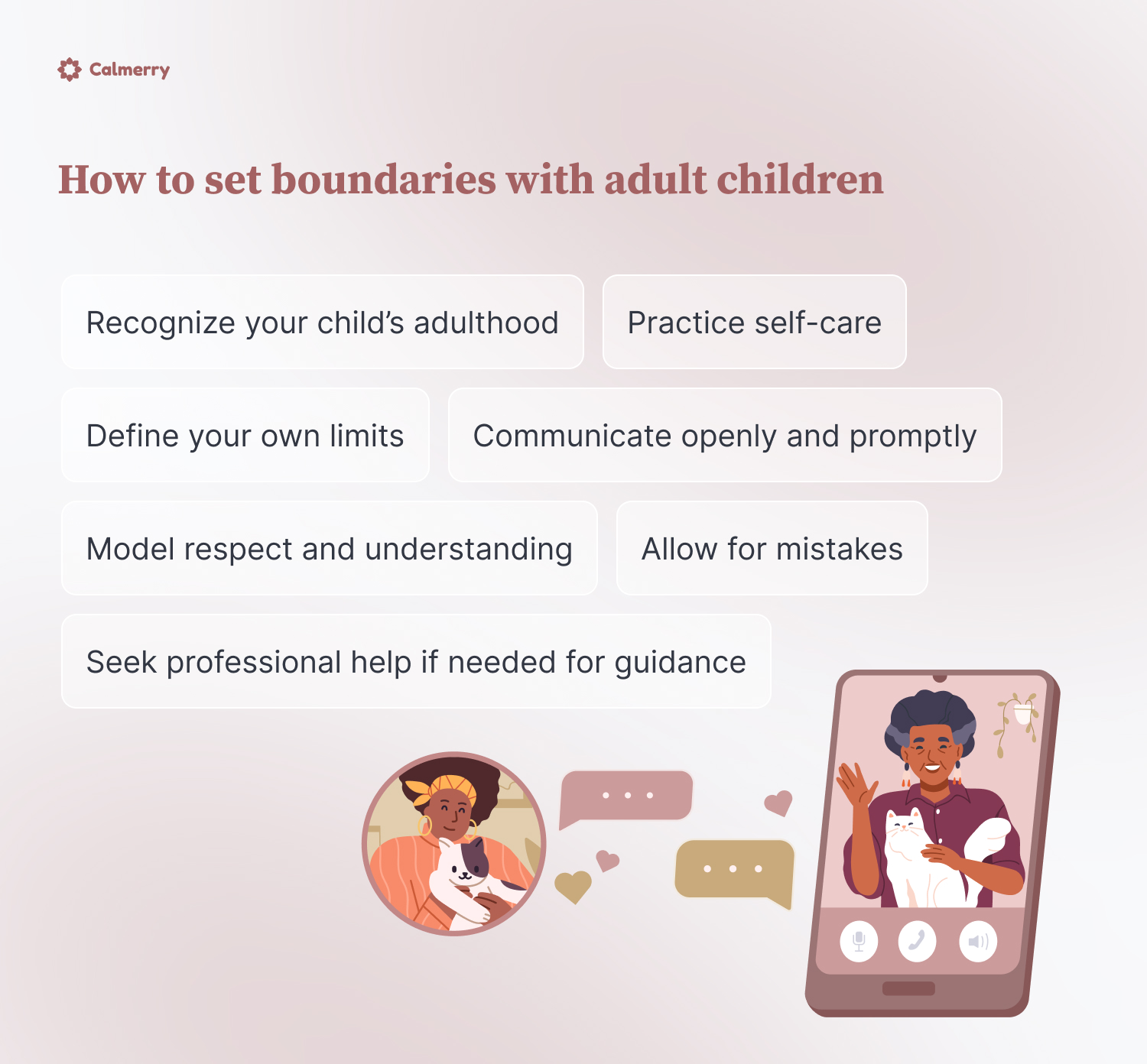Tips for Setting Boundaries with Your Adult Children

In this article
For parents of adult children, providing your support and understanding is a reasonable way to continue to show how much you love them.
As children enter adulthood, their needs and the parent’s role change. Setting boundaries with your adult children is critical in order to maintain a relationship that functions in a healthy way for both of you.
Parents of young children are naturally highly involved in their child’s life, as the needs of the child are greater. When a child becomes an adult, it’s time to step back and avoid becoming an overbearing parent for the emotional health of yourself and your adult child.
Setting boundaries with your adult children acknowledges the changing needs of your adult children and your own. By setting boundaries, you begin to assume a new role as the parent of an adult child and allow for their continued growth.
– Arabel Elliott, Master of Social Work (MSW)
Why are boundaries in parent-adult child relationships helpful?
As children grow into adulthood, research defines changes between parents and adult children, including communication, personal attitudes, and behavior. [1] Bozhenko, E. (2011). Adult child-parent relationships: On the problem of classification. Procedia – Social and Behavioral Sciences, 30, 1625–1629. https://doi.org/10.1016/j.sbspro.2011.10.315
Acknowledging these changes and setting clear boundaries gives parents of adult children the opportunity to model respect and understanding for their adult child and prioritize their own crucial needs.
A lack of boundaries between parents and adult children often leads to increased conflict and can have negative physical and emotional outcomes for older parents based on research in family dynamics. [2] Jabbari, B. (2023, September 16). Family dynamics. StatPearls – NCBI Bookshelf. https://www.ncbi.nlm.nih.gov/books/NBK560487/
For parents of adult children, it’s important to draw a distinction between providing support and enabling an adult child.
If you, as a parent, are always stepping in to “save” your adult child, they can’t develop confidence or the skills to correct mistakes or manage their own lives.
– Arabel Elliott, Master of Social Work (MSW)
When there is a lack of boundaries between parents and their adult children, parents may overstep and jump in to “rescue” their adult child. Repeating this pattern too often leaves parents drained, frustrated, and angry towards the adult child who does not act as the parent hoped.
Adult children who have a lack of boundaries due to their parents’ overinvolvement in their lives can become needy, dependent, and manipulative.
Parents who set healthy boundaries with adult children let them know that they believe in the adult child’s own ability to manage their lives.
Setting boundaries with your adult children is a clear way to send a message of respect and support for the child as an adult, not a dependent.
For the parent, as their role changes with an adult child, setting boundaries allows them to acknowledge and prioritize their own needs in a constructive and fitting manner.

What are good boundaries with adult children?
Setting boundaries with adult children may be challenging, but it is the most healthy way for parents to recognize and show love for their adult children and acknowledge and respect their own changing roles and needs.
Below are examples of reasonable areas for setting boundaries with adult children.
Mutual respect
Parents can set boundaries that promote mutual respect. This can encompass discussing guidelines for conversations that include listening to others, avoiding judgements, and speaking kindly even during disagreements.
Stating clear and healthy boundaries of mutual respect can lead to fewer family conflicts over time.
Communication
Parents can define for themselves and seek input from adult children on setting boundaries for appropriate forms of communication.
This might include stating preferred methods of communication such as texting or phone calls, times of day, and limits on the frequency of communications.
Communication is key to any relationship, and setting boundaries on communication helps avoid a lack of it as well as an unproductive overabundance of it.
– Arabel Elliott, Master of Social Work (MSW)
Financial support
Parents might establish boundaries on forms and amounts of financial support that they are comfortable providing their adult children.
This can also consist of setting boundaries on the amount of financial support, purposes for which they are and are not comfortable providing financial support, and for how long.
Personal choices
Parents can set boundaries regarding personal choices while still showing respect for an adult child’s autonomy and decision-making.
For example, parents can request that children refrain from vaping or engaging in excessive use of profanity while in the parents’ presence or at home.
Parents do not have control over an adult child’s choices, but they can set boundaries with adult children when they are in the parent’s presence.
Time and availability
Parents may set boundaries regarding their time and availability. For example, parents may share how often they are available to attend family events, if they can provide assistance to adult children, and when parents need their own time and space.
Parents of adult children are not required to be available to suit the needs of their adult children. It should be a mutually agreed and defined set of boundaries.
Privacy
Parents may need to reset boundaries regarding privacy with adult children. As roles between parents and adult children change, it’s important to be respectful and clear about this issue.
If adult children are visiting parents, the parents may need to set limits on establishing personal space, having guests in the parent’s home, and respecting guidelines on access to personal space and belongings.
Living arrangements
Parents may find themselves in the position of setting boundaries with adult children regarding living arrangements.
Parents with adult children living at home may want to define the limitations on the amount of time adult children can continue to live at home.
Or they may set boundaries by asking that they contribute to household expenses.
How to set boundaries with adult children
Parents of adult children can find it awkward and challenging to set boundaries. It’s important to give it time and remain patient.
Below are some ways to help parents set boundaries with adult children.
Recognize your child’s adulthood
Recognize that your child is now an adult and deserves their autonomy and independence. You don’t have to agree with them; you do need to respect their lifestyle, and the right to have their own opinions and make choices.
Communicate openly and promptly
Have open and honest conversations about boundaries and other issues for that matter. Waiting until there is a problem is not a good way or time to resolve or discuss anything.
Define your own limits
Identify your own limits and what is comfortable for you in areas such as financial support, emotional involvement, personal space, and involvement in decision-making.
Having clear, mutually understood definitions is vital for a healthy relationship between parents and adult children.
Model respect and understanding
Modeling the respect and understanding you want from your adult child includes respecting their boundaries and understanding their different needs, priorities, and values.
If you as a parent want that in return, it’s important to show it to your adult child.
Allow for mistakes
Setting boundaries is a process, so allow for mistakes. Be patient with yourself as a parent and with your adult child. Mistakes can and will happen. Recognizing them in a non-judgemental way and learning from them is key.
Practice self-care
Acknowledging your own needs and taking care of your well-being is critical for parents when setting boundaries with adult children. The process can be overwhelming and frustrating, but taking the time to practice self-care helps you stay healthy and models that for your adult child.
Seek professional help if needed
Nobody can do everything alone. When you find it a persistent problem setting boundaries with your adult child and conflicts are constant, it’s important to seek the advice of a professional.
A professional can provide the necessary methods and techniques to address complex family dynamics.
Seeking support: when and how to consult professionals
Knowing when to seek professional therapy to help with setting boundaries with your adult children is not easy. If you find yourself over-involved and solving problems for your adult child when there’s persistent conflict, professional therapy can offer solutions for both parents and their adult children.
Calmerry is an online therapy platform for adults 18 years of age and older that can provide the support and resources you need as a parent for setting boundaries with your adult children.
By using professional online therapy, you can get support and information about how to set boundaries with your adult children. This can include techniques that lead to better communication, mutual respect, and understanding with your adult child.
– Arabel Elliott, Master of Social Work (MSW)
Online therapy with professionals at Calmerry is not only safe but it can be as effective as in-person therapy, as well as being a more convenient and accessible way for you to engage with a qualified professional.
Start with a brief survey to get matched with a therapist best suited to help you work towards healthy family relationships that include setting boundaries with your adult child.
Please note: currently, we offer only individual, 1-on-1 sessions.
Bozhenko, E. (2011). Adult child-parent relationships: On the problem of classification. Procedia – Social and Behavioral Sciences, 30, 1625–1629. https://doi.org/10.1016/j.sbspro.2011.10.315
Jabbari, B. (2023, September 16). Family dynamics. StatPearls – NCBI Bookshelf. https://www.ncbi.nlm.nih.gov/books/NBK560487/
online therapy
live video session


